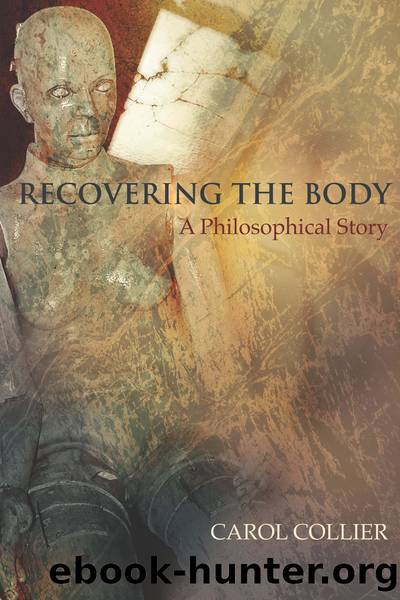Recovering the Body by Carol Collier

Author:Carol Collier
Language: eng
Format: epub
Publisher: Ottawa University Press
Published: 2013-08-15T00:00:00+00:00
CHAPTER VI
THE ROAD NOT FOLLOWED: SPINOZA
As we have seen in Chapter 5, in spite of the radical nature of his metaphysics, Descartes was what we might today consider a mainstream thinker. He occupied the same conceptual space as his predecessors, and, while he transformed many ancient concepts and ideas, he took pains to remain within the confines of religious orthodoxy. He would not publish his important work on physics because of the controversy over Galileo and the heliocentric universe. He did his best not to offend the religious authoritiesâand even to solicit their approvalâas can be seen in the Introduction to his Meditations, which he dedicated to the good doctors of the Sorbonne. In fact, his need to accommodate Christian belief in an immortal soul in his new mechanistic philosophy was at the root of many of the ambiguities in his dualism; he chose orthodoxy at the price of philosophical clarity.
By contrast, Spinoza took few of Descartesâ precautions and became the most notable renegade of the seventeenth century. His philosophy fits into my story of the body as the road not followed largely because of this simple fact: he was a heretic. He was excommunicated from the Synagogue of Amsterdam in 1656 with the following words:
Cursed be he by day and cursed be he by night; cursed be he when he lies down, and cursed be he when he rises up; cursed be he when he goes out, and cursed be he when he comes in. The Lord will not pardon him; the anger and wrath of the Lord will rage against this man, and bring upon him all the curses which are written in the Book of the Law, and the Lord will destroy his name from under the Heavensâ¦.
We ordain that no one may communicate with him verbally or in writing, nor show him any favour, nor stay under the same roof with him, nor be within four cubits of him, nor read anything composed or written by him.1
In addition, his major work, the Ethics, was put on the Index Librorum Prohibitorum, the Catholic Churchâs list of forbidden readings, and remained there until well into the twentieth century, when the Index was abolished. If Spinozaâs road was not followed, it is at least in part because of the enduring perception of him as a renegade (not to mention an atheist). Today, his philosophy is enjoying a renaissance, and from our perspective it appears that his ideas might have been misunderstood in his time. It has even been suggested that he really did not want his work to be understoodâexcept by the few who were capable of grasping his meaning and his method.2
Baruch Spinoza was born in 1632 into a family of formerly Spanish Jews who had settled in Portugal after having been expelled from Spain during the Inquisition. These transplanted Spanish Jews were referred to as Marranos;3 most of them continued to practise their Jewish faith in secret, even though they had been forced to convert to Christianity.
Download
This site does not store any files on its server. We only index and link to content provided by other sites. Please contact the content providers to delete copyright contents if any and email us, we'll remove relevant links or contents immediately.
The remains of the day by Kazuo Ishiguro(8999)
Tools of Titans by Timothy Ferriss(8396)
Giovanni's Room by James Baldwin(7346)
The Black Swan by Nassim Nicholas Taleb(7129)
Inner Engineering: A Yogi's Guide to Joy by Sadhguru(6794)
The Way of Zen by Alan W. Watts(6614)
The Power of Now: A Guide to Spiritual Enlightenment by Eckhart Tolle(5781)
Asking the Right Questions: A Guide to Critical Thinking by M. Neil Browne & Stuart M. Keeley(5775)
The Six Wives Of Henry VIII (WOMEN IN HISTORY) by Fraser Antonia(5515)
Astrophysics for People in a Hurry by Neil DeGrasse Tyson(5189)
Housekeeping by Marilynne Robinson(4447)
12 Rules for Life by Jordan B. Peterson(4304)
Ikigai by Héctor García & Francesc Miralles(4274)
Double Down (Diary of a Wimpy Kid Book 11) by Jeff Kinney(4272)
The Ethical Slut by Janet W. Hardy(4253)
Skin in the Game by Nassim Nicholas Taleb(4248)
The Art of Happiness by The Dalai Lama(4130)
Skin in the Game: Hidden Asymmetries in Daily Life by Nassim Nicholas Taleb(4006)
Walking by Henry David Thoreau(3962)
